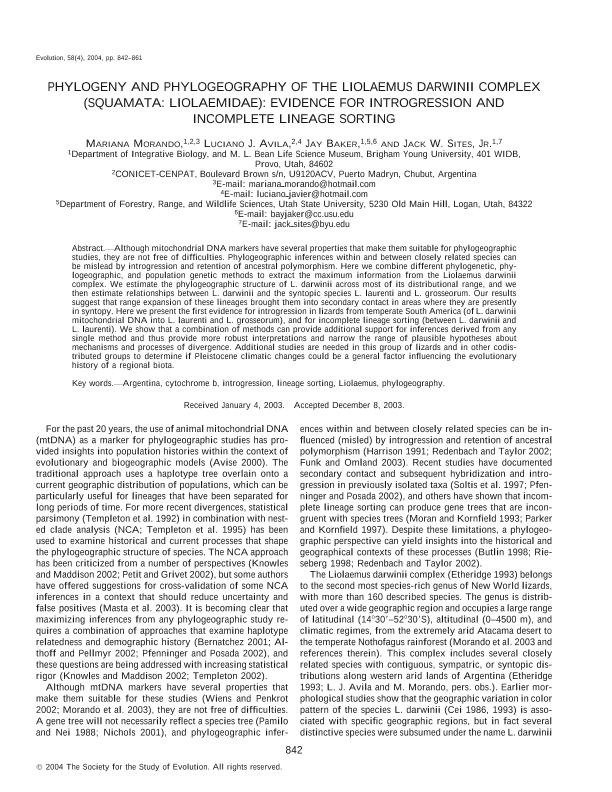Mostrar el registro sencillo del ítem
dc.contributor.author
Morando, Mariana

dc.contributor.author
Avila, Luciano Javier

dc.contributor.author
Baker, Jake
dc.contributor.author
Sites, Jack W.

dc.date.available
2020-05-14T19:43:01Z
dc.date.issued
2004-04
dc.identifier.citation
Morando, Mariana; Avila, Luciano Javier; Baker, Jake; Sites, Jack W.; Phylogeny and phylogeography of the Liolaemus darwinii complex (Squamata: Liolaemidae): Evidence for introgression and incomplete lineage sorting; Society for the Study of Evolution; Evolution; 58; 4; 4-2004; 842-861
dc.identifier.issn
0014-3820
dc.identifier.uri
http://hdl.handle.net/11336/105153
dc.description.abstract
Although mitochondrial DNA markers have several properties that make them suitable for phylogeographic studies, they are not free of difficulties. Phylogeographic inferences within and between closely related species can be mislead by introgression and retention of ancestral polymorphism. Here we combine different phylogenetic, phylogeographic, and population genetic methods to extract the maximum information from the Liolaemus darwinii complex. We estimate the phylogeographic structure of L. darwinii across most of its distributional range, and we then estimate relationships between L. darwinii and the syntopic species L. laurenti and L. grosseorum. Our results suggest that range expansion of these lineages brought them into secondary contact in areas where they are presently in syntopy. Here we present the first evidence for introgression in lizards from temperate South America (of L. darwinii mitochondrial DNA into L. laurenti and L. grosseorum), and for incomplete lineage sorting (between L. darwinii and L. laurenti). We show that a combination of methods can provide additional support for inferences derived from any single method and thus provide more robust interpretations and narrow the range of plausible hypotheses about mechanisms and processes of divergence. Additional studies are needed in this group of lizards and in other codistributed groups to determine if Pleistocene climatic changes could be a general factor influencing the evolutionary history of a regional biota.
dc.format
application/pdf
dc.language.iso
eng
dc.publisher
Society for the Study of Evolution
dc.rights
info:eu-repo/semantics/openAccess
dc.rights.uri
https://creativecommons.org/licenses/by-nc-sa/2.5/ar/
dc.subject
ARGENTINA
dc.subject
CYTOCHROME B
dc.subject
INTROGRESSION
dc.subject
LINEAGE SORTING
dc.subject
LIOLAEMUS
dc.subject
PHYLOGEOGRAPHY
dc.subject.classification
Otras Ciencias Biológicas

dc.subject.classification
Ciencias Biológicas

dc.subject.classification
CIENCIAS NATURALES Y EXACTAS

dc.title
Phylogeny and phylogeography of the Liolaemus darwinii complex (Squamata: Liolaemidae): Evidence for introgression and incomplete lineage sorting
dc.type
info:eu-repo/semantics/article
dc.type
info:ar-repo/semantics/artículo
dc.type
info:eu-repo/semantics/publishedVersion
dc.date.updated
2020-04-27T14:42:31Z
dc.identifier.eissn
1558-5646
dc.journal.volume
58
dc.journal.number
4
dc.journal.pagination
842-861
dc.journal.pais
Estados Unidos

dc.description.fil
Fil: Morando, Mariana. Consejo Nacional de Investigaciones Científicas y Técnicas. Centro Científico Tecnológico Conicet - Centro Nacional Patagónico; Argentina. University Brigham Young; Estados Unidos
dc.description.fil
Fil: Avila, Luciano Javier. Consejo Nacional de Investigaciones Científicas y Técnicas. Centro Científico Tecnológico Conicet - Centro Nacional Patagónico; Argentina
dc.description.fil
Fil: Baker, Jake. State University of Utah; Estados Unidos. University Brigham Young; Estados Unidos
dc.description.fil
Fil: Sites, Jack W.. University Brigham Young; Estados Unidos
dc.journal.title
Evolution

dc.relation.alternativeid
info:eu-repo/semantics/altIdentifier/url/https://www.jstor.org/stable/3449280?seq=1
Archivos asociados
